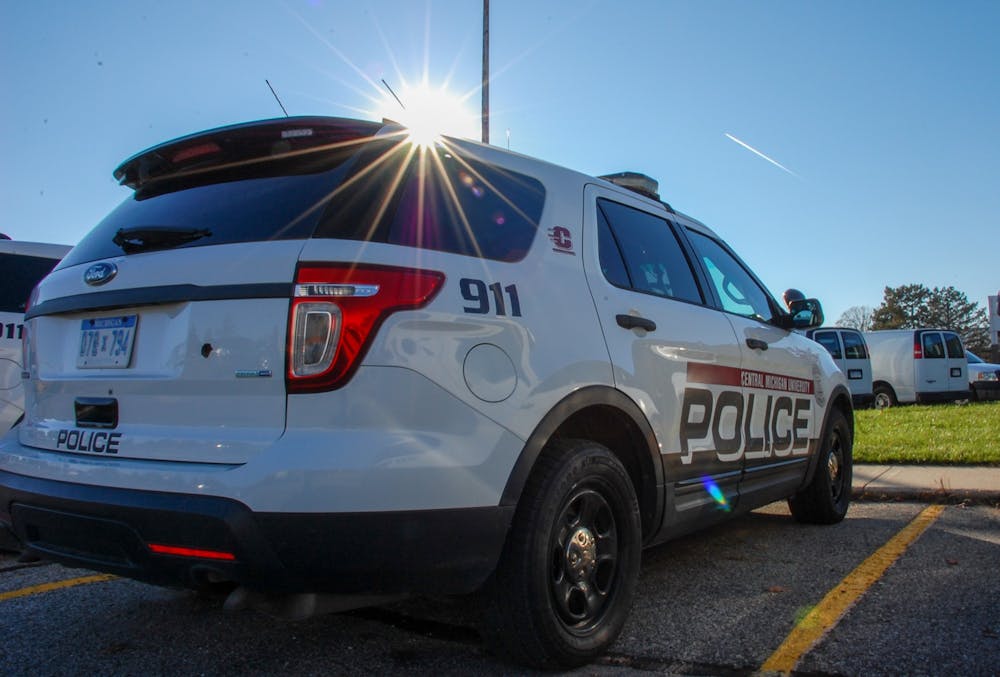Drug-impaired driving is rising in Michigan: This is what it means for Mount Pleasant

A police car Saturday, Oct. 29 outside the Central Michigan University Police Department. CM Life File Photo.
Police across Michigan are seeing more drivers under the influence of drugs, and Mount Pleasant is no exception.
From busy college streets to rural county roads, local officers said drug impairment is quietly fueling more crashes, straining law enforcement already juggling alcohol-related and distracted driving cases.
According to Michigan State Police, data show that comparing 2024’s statistics to 2023’s numbers, findings include:
· Drug-involved crashes (2,315) rose 3% and drug-involved fatalities (272) rose 6%.
· Teen (aged 13-19) fatalities (77) rose 17%.
The Michigan Office of Highway Safety Planning reported 2,250 drug-involved crashes in 2023 that resulted in 256 deaths, while alcohol-involved crashes accounted for 297 deaths.
Even as the numbers climb, enforcement has dipped. According to FOX2 Detroit, Michigan’s DUI arrests fell 4% in 2024 and are now nearly 30% lower than a decade ago, due in part to staffing shortages and fewer officers trained in drug detection.
Mount Pleasant Reflects the Statewide Trend
The Mount Pleasant Police Department reminded residents that 41% of Michigan’s fatal crashes involve alcohol or drugs.
"We continue to see impaired driving in many forms, from alcohol to marijuana to prescription medications,” the department noted in a 2024 public safety update.
In September 2025, a vehicle struck a school bus in Mount Pleasant, injuring one person and leading to an Operating While Intoxicated arrest. A few months earlier, in April 2025, two Mount Pleasant residents were charged after police in neighboring Midland County found cocaine, fentanyl and buprenorphine during a traffic stop.
Kevin Dush is a CMUPD Lieutenant, has been with CMUPD since 2022 and has over 20 years in law enforcement, including supervisory and administrative roles at the Isabella County Sheriff's Office.
Dush, who works closely with CMU’s campus area patrols, said there isn’t one specific kind of traffic stop that leads to impaired-driving arrests.
“Any traffic violation can turn into an impaired-driving investigation,” Dush said. “It might start with speeding, running a stop sign, or even a broken headlight. There’s no specific pattern; it’s pretty random.”
Marijuana impairment remains one of the hardest challenges for police, especially since THC can stay in the bloodstream for days after use.
Mount Pleasant officers rely on standardized field sobriety tests — a national system developed by the Office of Highway Safety Planning and National Highway Traffic Safety Administration (NHTSA).
“Police officers go through what’s called Standardized Field Sobriety Test training,” Dush said. “It’s the same across the country; the walk-and-turn, the one-leg stand, and the eye-movement test. Those are standardized by NHTSA and the state."
When an officer suspects drug impairment, they can also request a blood or urine test.
“If we believe someone’s impaired, we’ll conduct field sobriety tests and then seek chemical evidence: blood, breath, or urine,” he explained. “If a driver refuses, we may have to get a warrant from a judge.”
These procedures, they said, are especially important after crashes.
“In the event of an injury crash, we have to consider whether their behavior is due to injuries, intoxication, or both,” the officer said. “Sometimes we can’t do field tests, so we rely on other observations and evidence from hospitals.”
Legal Consequences for Students and Drivers
Under Michigan law, driving high is treated the same as drunk driving; both fall under the state’s “Operating While Intoxicated” statute.
“There’s no separate charge for marijuana versus alcohol,” Dush said. “If you’re high and driving, you can still be arrested and charged just the same.”
For a first offense, the penalties are steep: up to 93 days in jail, a fine, six points on a driver’s license and potential license suspension. Insurance premiums often rise dramatically afterward.
“Even beyond court fines, people forget about the impound fees, the insurance hikes, and the embarrassment of losing your license,” Dush added. “It affects more than just one night’s decision.”
Dush said the most devastating part of the job is delivering news to families after a fatal crash.
"It is absolutely devastating for a family member to lose a loved one in a traumatic way," Dush said. "Such as an automobile accident, and if somebody makes a choice to drink or use drugs prior to driving, and they are involved in a traffic crash, even if they're not the one that causes the crash, they're going to get in big trouble."
Dush said he has one message for college students and the Mount Pleasant community:
“Please don’t drive high," Dush said. "Please don’t drive drunk. The penalties only get worse if you hurt or kill someone, but the emotional damage is something you can never undo."



